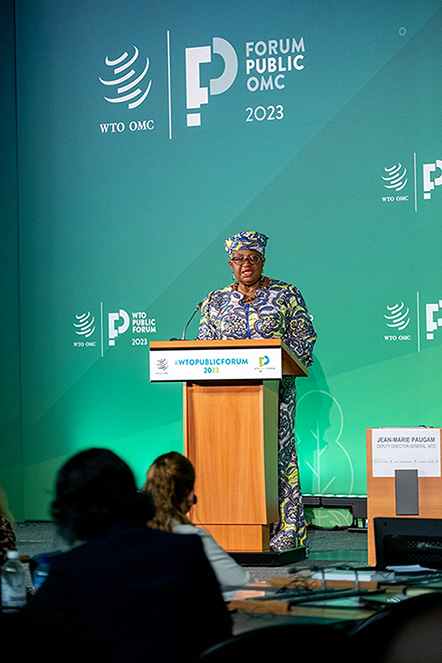CLIMATE CHANGE
More
In her opening remarks, Director-General Ngozi Okonjo-Iweala noted that the steel industry needs the right trade policy environment to support its decarbonization efforts, stressing the importance of an environment which should enable investments in breakthrough technologies, ensure availability of critical inputs, and increase the demand and cost competitiveness of green steel.
While a range of policy instruments will be needed to speed up decarbonization, including price and non-price measures, incentives, and standards, the DG noted that the growing fragmentation of trade policies is making it harder for the steel sector to decarbonize, creating uncertainties for producers and hampering the cross-border movement of green technologies and inputs.
She said: “The WTO can play an important role as a forum for international cooperation between private and public stakeholders to better align and coordinate trade policy for a level playing field.”
Representing the United Arab Emirates' Presidency of COP28, Dr Yasar Jarrar said that enhancing coherence of steel decarbonization standards, inclusive access to technologies, and market creation for green steel were priorities for COP28's Energy and Industry Day, which will take place on 5 December. He also noted that work by the WTO on steel industry decarbonization can make a positive contribution to the upcoming COP28.
Xiao Guodong, Chief Representative for Carbon Neutrality of China Baowu Steel Group, the world's largest steelmaker, said that decarbonization marks a revolution for the steel industry. Mutual recognition of standards, including through the WTO, is important to allow steelmakers to efficiently meet downstream consumer demands. When thinking about the decarbonization transition, he said that the situation of developing countries should be considered in terms of energy endowment, and access to technologies and inputs.
Noting that carbon pricing has an important role to play in reaching net zero for greenhouse gas emissions, Rajiv Mangal, Vice President for Safety, Health and Sustainability of Tata Steel, said that implementation of a Carbon Border Adjustment Mechanism could help provide a level playing field for steel in the European Union by ensuring that the cost of carbon is passed on to consumers. He also highlighted the importance of global convergence on financial reporting standards for emissions disclosure to allow finance to flow to the right places.
Erika Chan, Head of Sustainability at United States Steel, noted that the path to net zero requires significant investment, not just in projects and infrastructure but also in the workforce. However, she noted that the global steel market environment is an inhibiting factor to profitability of such investments. As a company that operates both blast furnaces and electric arc furnaces, she highlighted the importance of a global approach to standards that recognize multiple production routes through a sliding scale.
Ola Hansén, Public Affairs Director at H2 Green Steel, emphasized the need for a price on emissions and creating demand for near-zero steel. He also noted that in order to secure investment in their green hydrogen-based steel production, which emits 95% less greenhouse gases as compared to traditional steel production, H2 Green Steel relies on demand from upstream consumers, such as automakers, which is created through their voluntary commitments under the Science Based Targets Initiative.
In closing the session, WTO Deputy Director-General Jean-Marie Paugam highlighted the opportunity to capitalize on the positive role that trade can play for steel industry decarbonization at the upcoming COP28. He acknowledged that the private sector is asking the WTO to do more, whether contributing to the alignment of standards or making sense of divergent pricing and incentive policies.
The Public Forum session was a follow-up to the first-ever WTO Trade Forum for Decarbonization Standards: Promoting coherence and transparency in the iron and steel sector, held in March 2023. The Trade Forum brought together officials and business leaders from many of the world's largest steel-producing economies for a dialogue on how interoperable standards for measuring greenhouse gas emissions can accelerate the global scale-up of lower-emissions steelmaking.
Share
Share
Problems viewing this page? If so, please contact [email protected] giving details of the operating system and web browser you are using.
